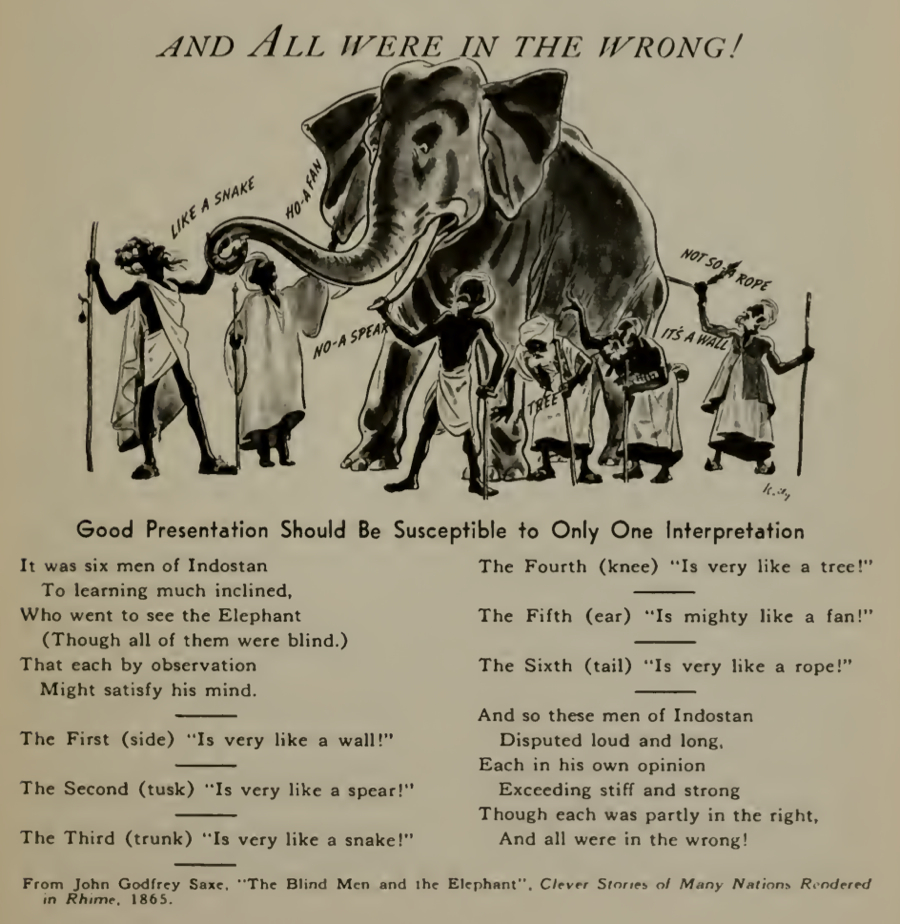WE think no differently today.
One person's life experiences are totally different from another and a vast understanding gap exists; almost to the point of calling the other guy a liar.
I have this image continually brought to mind...

That’s entirely possible. Some Jews were filled with hatred for Poles who saved them. I think they resented the fact that the Polish state, the Polish society and peopel survived while everything Jewish was wiped out in Poland.
This comes through rather well in the following documentary:
Description excerpt: “This award-winning documentary tells the dramatic and emotional story of a Jewish father who journeys with his two ultra-orthodox adult sons back to Poland to try to find the Christian farmers who hid their family from the Nazis. To his sons, like many offspring of Polish Holocaust survivors, this is a country whose people are incurably anti-Semitic and beyond redemption. His hope is to instill in his insulated and narrow-minded sons the power of interfaith tolerance and trust.”
The grandfather was the one hidden - at incredible personal risk - by the Christian family. The family told him essentially, “If you get to America, remember us one day (i.e. send us some money if you succeed in life).” The grandfather did succeed but absolutely refused to help the Polish family. His son took it upon himself to hunt down the family with his two adult sons (who are clearly anti-Christian, anti-Polish bigots) to support the effort but give in. They are changed by what they discovered.
It’s available on Netflix I believe.
Another documentary I saw centered around a Jewish American survivor of the holocaust who had became a success on the textile business. His whole family and just about every Jew in a particular Polish town had been wiped out. He ended up meeting and working with a Polish historian who was trying to research what happened and how. The most interesting scene was when he returned to the town and encountered an old man who knew his father. He asked him why didn’t the Poles do anything to help the town’s Jews when the Nazis came for them? The old man told a story. In the story, he admitted that he had been a poacher and had killed two deer. He took the deer to the father of the Jewish-American man who ran a successful and prosperous business in town and they made an agreement on a price for the deer. Then the father refused to pay the price he had agreed to. He ripped the man off. When the Jewish American man heard the old Pole tell this story he went nuts denying his father would ever do such a thing. It was telling. The old Pole seemed very sincere in his story. There was no logical reason for him to make up such an elaborate story for such a question. The Jewish American man, robbed of his family, naturally only remembered (or only knew) about their good points and couldn’t imagine they would have traits that made enemies. None of that excused anything, of course, but it was a fascinating insight into how people thought at the time.
WE think no differently today.
One person's life experiences are totally different from another and a vast understanding gap exists; almost to the point of calling the other guy a liar.
I have this image continually brought to mind...
